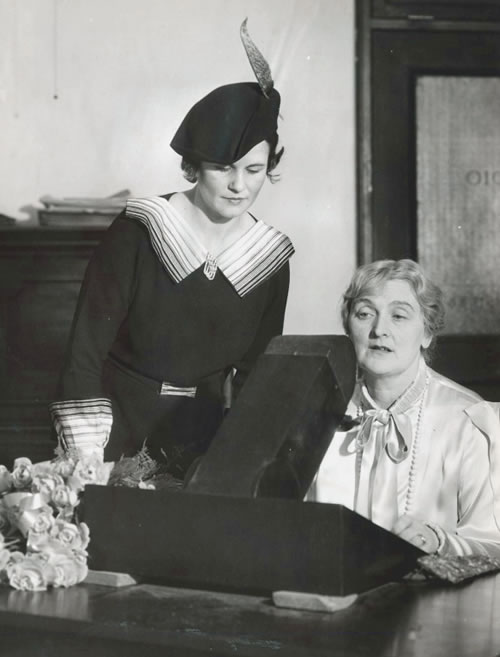Markdown Embed Code:
Actor Sybil Thorndike seated in front of a machine at the studios of the American Foundation for the Blind in December 1934. Thorndike was the first woman to record a Talking Book. Thorndike is wearing a silk-like blouse with long sleeves. Standing on her right is Jane Muhfeld, a blind auditory expert at AFB. Muhfeld is wearing a hat that is tilted to one side with a feather in the top and a long-sleeved dark dress with light contrasting wide lapels and large cuffs. Talking Book Archives, American Foundation for the Blind.
By the spring of 1934, five thousand Talking Book machines had been ordered in seventeen states, reassuring the Library of Congress that there would be enough machines on which to play the records. As a result, the Library of Congress released the ten-thousand-dollar government appropriation to produce recorded books and the Talking Book project began.
At the same time, following intensive negotiation, AFB signed a contract with the Authors' Guild of the Authors' League of America and the National Association of Book Publishers. This contract permitted AFB to record titles on behalf of the Library of Congress without having to pay royalty fees to the authors, as long as the records remained solely for the use of the blind. A nominal fee of twenty-five dollars was paid for the use of each title.
Some of the first titles recorded by AFB for the Library of Congress were: Four Gospels, the Psalms; the Declaration of Independence and the Constitution of the United States of America, as well as works by William Shakespeare and both classic and popular works of fiction.
In the 1940s, a wide variety of Talking Books were recorded, including President Franklin D. Roosevelt's message to Congress after the attack on Pearl Harbor, a series on bird sounds prepared by The Department of Ornithology of Cornell University, and a series produced by Columbia Broadcasting System (CBS) entitled People at Work. Berthold Lowenfeld, an eminent education specialist in the blindness field recorded a series entitled Guide to Symphonies.
